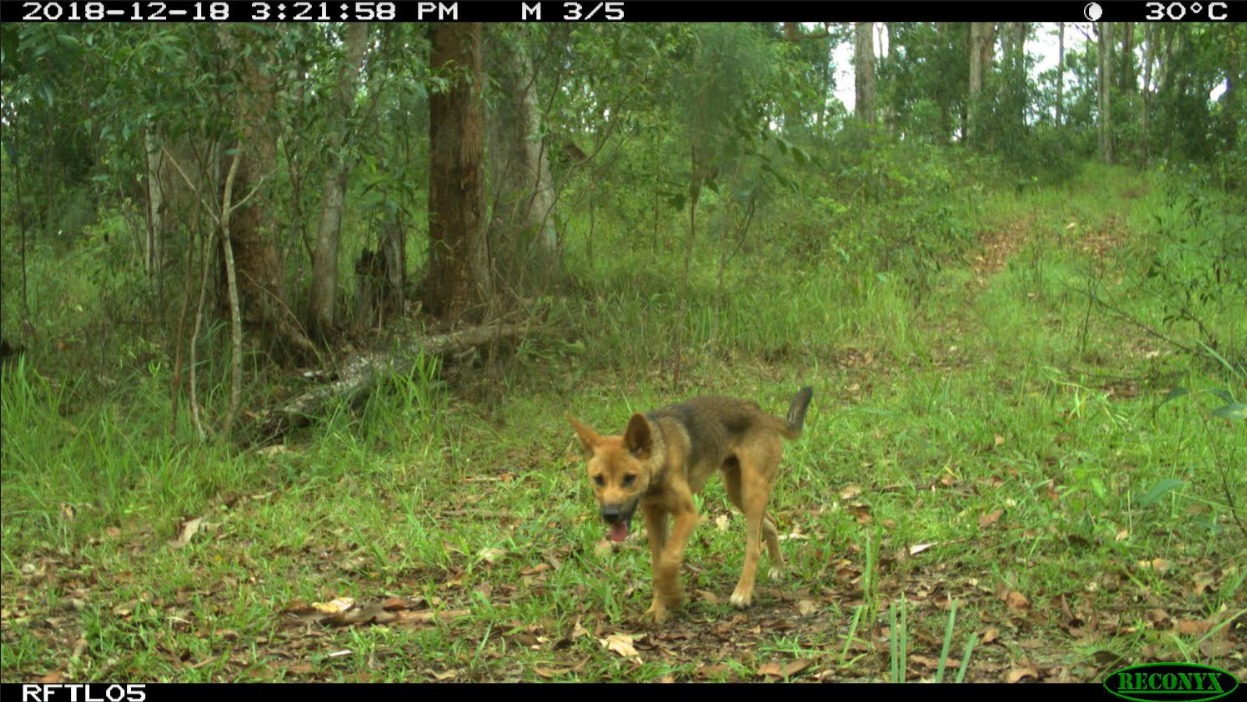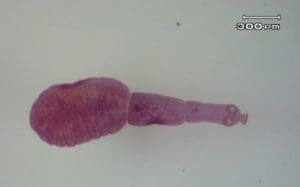
A wild dog photographed wandering in urban bushland near homes and roadsides. Image – Lana Harriott.
WILD dogs in urban areas have been found to carry a range of parasites that pose a risk to human health and to domestic dogs.
Research by Australian scientists published in the journals Wildlife Research and Australian Mammalogy identifies that four in five wild dogs tested were infected with parasitic worms known as helminths.
More than half of the wild dogs tested were positive for a hydatid tapeworm known as Echinococcus granulosus, which can cause disease in humans if they come in contact with infective eggs shed into the environment via dog faeces.
Centre for Invasive Species Solutions funded lead researcher Dr Lana Harriott said the research showed that urban wild dogs should be considered a significant public health threat, as well as a major predation threat to native wildlife.
“Wild dogs can live within 1000 metres of residential houses at all times, and repeatedly cross roads, suburban backyards and frequently utilised public areas such as school yards and parklands.
“Urban areas such as south east Queensland are highly populated and home to more than 3.4 million residents, and this research is prompting new strategies to minimise the risks wild dogs could pose to human and animal health to protect native wildlife, domestic animals and the public,” she said.
The Centre for Invasive Species Solutions said the research improved understanding of the potential impacts of wild dogs in urban areas so that management strategies and options could be developed for land managers. The research also identified the importance of protecting domestic dogs from these threats, through ensuring they have regular worming, as well as the importance of personal hygiene particularly for professional wild dog controllers. These simple steps can all assist in mitigating the risk posed by parasites carried by the urban wild dog population, the centre said.
Potential tapeworm-wallaby link found

The hydatid tapeworm can cause disease in humans. Image – Lyn Knott, School of Veterinary Science, UQ.
Dr Harriott also found that wild dogs preyed heavily on macropod species, such as the swamp wallaby, and this could be a significant reason for seeing such a high occurrence of the hydatid tapeworm within wild dog populations. Her initial research was undertaken as part of her PhD supported through the Invasive Animals Cooperative Research Centre.
“We analysed the stomach contents of 170 urban wild dogs for prey and then associated this with their known infection status of key zoonotic pathogens.
“Wild dogs that had adult hydatid tapeworms in their intestinal tracts were significantly more likely to have consumed swamp wallabies,” Dr Harriott said.
“The findings demonstrate the importance of managing the complete tapeworm lifecycle and the important role that wild dog diet plays in the ability for the tapeworm to survive.”
In Queensland, the wild dog is a restricted invasive animal under the Biosecurity Act 2014. Under this Act, everyone has a general biosecurity obligation to take reasonable and practical steps to prevent or minimise the risks associated with all biosecurity matter, including invasive animals, under their control.
The research paper “Zoonotic and economically significant pathogens of peri-urban wild dogs across north-eastern New South Wales and south-eastern Queensland, Australia” can be downloaded through Wildlife Research.
The research paper titled “The association between diet of peri-urban wild dogs and zoonotic pathogen carriage” can be downloaded through Australian Mammalogy.
Further information on management of wild dogs in urban areas you can visit our PestSmart website – https://www.pestsmart.org.au/peri-urban-wild-dog/

HAVE YOUR SAY